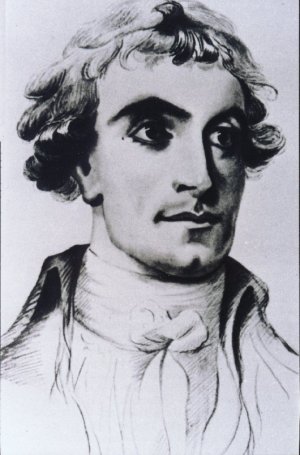Sir William Jones
by Dr. K. L. Kamat
Last Updated: December 07, 2024
The author pays tribute Sir William Jones, the great scholar and visionary, who came to India as a judge of the Supreme court, and with the help of Charles Wilkins, in 1784 started the Asiatic Society of Bengal and the journal Asiatic Researches. These two institutions were instrumental in establishing the field of Indology - Ed.
William Jones was born in London on 28th September 1746. His father died when William was only three years old, But his mother aroused boundless curiosity in him. At a tender age of twenty he became adept in French, Italian, Spanish, Portuguese, Greek, Latin and English. His knowledge of Arabic and Persian made King Christian VII of Denmark assign him the translation of "Tariq-i-Nadiri" into French. He was made a fellow of the Royal Society in 1772 and in the following year, a member of the prestigious Literary Club of Dr. Johnson.
© K. L. Kamat

Sir William Jones (1746-94)
Jones arrived in India in September 1783 a judge in the Supreme Court in Calcutta. he realized that India had much to offer to the world in the sciences and the arts, and that the discovery of her rich past and culture could not be achieved by himself. He discussed with his colleagues and established the "Asiatic Society" on 15th January 1784, and this was a revolutionary event in the world of letters. It marked the restoration of ancient learning in and about India. Jones realized that it was the East, which held the secrets of early history and civilization of man; and that unless the East was know, the history of man could not be written.
Jones invented the system of transliteration and translated the Laws of Manu (Manusmriti) into English. He was the first westerner to study and write a paper on Indian Classical Music, the first person to put forward a plan for classification of Indian plants and animals. He was instrumental for compilation of books on Botany, Zoology, Astronomy and Philosophy. He declared that the Sanskrit language is of wonderful structure, more perfect than Greek, more copious than the Latin and thus laid foundation for birth of Science of Linguistics. Thereafter, many western universities began founding chairs in Sanskrit. He translated Kalidasa's "Abhiknana Shakuntala" and "Ritu Samhara," and Jayadeva's "Gita Govinda" into English. This lead to study of Indian dramatic literature and mythology. Further he also encouraged study of Indian chronology.
On 27th April 1794 has passed away because of an inflammation of liver. He was only forty eight years old, and a great progress in the study of India was untimely curtailed.
![]()
See Also:
- The History of History of India at Kamat's Potpourri
- Remembering William Carey by K. L. Kamat
-
A Tribute to Sir
William Jones by Dr. K. Paddayya
